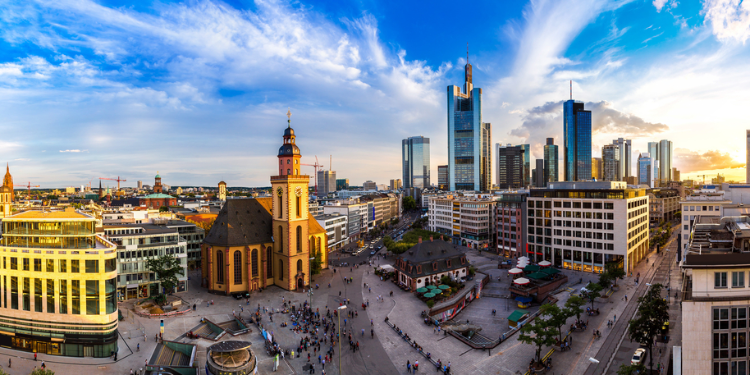
Like many countries after the pandemic, Germany is currently suffering from labor shortages. Hospitality, construction, manufacturing, services, healthcare, engineering and the sciences are all sectors needing foreign labor. The EU Blue Card and Job Seeker Visa are two common employment pathways for skilled non-EU immigrants. In addition, the country has recently announced a new points-based work visa called the Chancenkarte.
What is the Chancenkarte?
In September, the German government announced a new visa for prospective non-EU expats without a job offer – the Chancenkarte. It is a points-based visa modeled on the Canadian one. It hasn't started accepting applications yet, but some details are already available. It will accept applicants who are under the age of 35, have a degree or vocational qualification, have 3 years of work experience and a B1 level in German.
In a certain way, the Chancenkarte is an updated version of the Jobseeker Visa. It will also require applicants to have sufficient funds to live in Germany until they can find a job. However, it will not restrict the job-hunting period to 6 months like the older visa.
Over half of all German companies are understaffed
A study by the Association of German Chambers of Commerce and Industry in mid-2022 revealed that 56% of German companies are struggling to hire enough staff. There was a record number of 1.7 million vacancies in the country in July 2022, and in October, this number had already risen to 2 million. This situation is the combined result of the Great Resignation, the post-pandemic economic recovery in job creation, and the retirement or demise of Boomer workers.
Like many developed countries, Germany has an aging population. Judging from Statista's data, the percentage of Germans over the age of 65 will reach 25% in the next coming years. Indeed, as reported by DW News, the country is losing 350,000 active workers every year merely because those of the Boomer Generation – aged between 58 and 76 – are retiring or passing away. Meanwhile, the birth rate in the country is too low to add enough young workers to the economy. In 2022, only 10% of Germans are aged between 15-24 years old.
As a European Union country, Germany has historically benefited from freedom of movement within the region. However, as a professor of the Institute for Employment Research, Dr. Herbert Brücker, says, "EU nationals are increasingly less keen on moving to Germany as the salaries in their own countries rise". This is why Germany now has to focus on attracting highly-skilled workers from outside the European Union.
Germany needs foreign tradespersons, technicians and degree-educated professionals
The country is looking for skilled immigrants of 3 categories: skilled tradespersons with 2 years of vocational training (Category 1), technicians with a qualification (Category 2) and professionals with university degrees (Category 3).
As reported by Schengen Visa Info, workers from Category 1 are needed in the fields of elderly care and construction (especially for wells, canals, tunnels and underground spaces), as well as for the installation and maintenance of home utilities (heating, air conditioning, sanitation) and electric circuits. As for technicians (Category 2), they include plumbers, various therapists (speech therapists, physiotherapists, ergo therapists) as well as tax counselors. Graduates of Category 3 include lawyers, IT professionals (eg, software developers) and various medical specialists (pharmacists, anesthesiologists, internists, nurses, supervisors, etc.).
Immigrating to Germany with a job offer in hand
It's very good to know which jobs are in demand in Germany, but how exactly to access these jobs, especially as a third-country national without EU citizenship? There are three possible routes: an EU Blue Card, a Jobseeker Visa, or the brand-new Chancenkarte. The first one requires a job offer prior to entry.
The EU Blue Card allows third-country nationals to work in the European Union, including Germany, provided that they have a degree and a 1-year job offer in a field experiencing labor shortages. This job must pay the applicant at least €56,400 per annum. If the applicant is a professional in STEM (i.e., medicine, engineering, IT and the natural sciences), the income requirement is lower: €43,992. If a company urgently needs a certain expat worker, it can apply for the fast-track procedure via the Foreigners Authority. This way, the worker can get their Blue Card within 3 months.
The Blue Card lasts for the duration of the worker's employment, plus an additional 3 months, during which they can renew the card if their contract is extended or they find a new job. The card can last for a maximum of 4 years. After 3 years (33 months, to be more precise), the Blue Card holder can apply for a settlement permit. To obtain the settlement permit, they need to show proof of intermediate German proficiency, usually of a B1 level in the European framework.
How about skilled tradespeople or technicians without a university degree? The German Federal Employment Agency can grant them a residence permit if they cannot get a Blue Card. The agency will check if their certificates and vocational training match the job offer they've received in Germany.
The prospective employer of all three types of workers (tradespersons, technicians, graduate professionals) must also fill in a “Declaration regarding a contract of employment” to confirm that they will actually hire this expat. Expats who want to work in a regulated profession – like healthcare, law and public education – must also be granted a license from the Federal Employment Agency. It is granted after the competent German authority, for example, the German Federal Bar (for legal professionals), checks if their foreign qualifications are equivalent to those required in Germany to practice the profession.
What happens if their qualifications are only partially equivalent to those required in Germany? Is their application outright rejected? No, these expats will be given a chance to top up their missing credentials through refresher training in order to obtain an “Anpassungsqualifizierung,” which is an adaptation qualification. The training could be done in a company or an institution.
Immigrating to Germany without a prior job offer
How about prospective expats who don't have a job offer yet? They can enter Germany using the Jobseeker Visa. This visa allows skilled workers to enter Germany for a period of 6 months for the main purpose of looking for a job. These workers must have 5 years of professional experience, and they must prove to have enough savings to pay for all of their living expenses.
How about language requirements? The Job Seeker visa requires intermediate proficiency in German (B1), while the previously mentioned Blue Card has no language requirement. However, by the time a Blue Card holder applies for a settlement permit, they will need to have the same level of German.



















